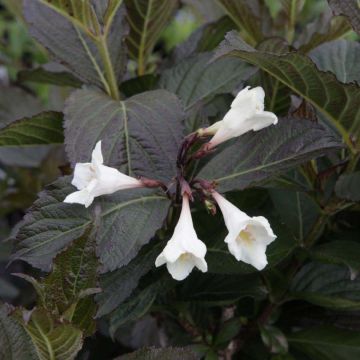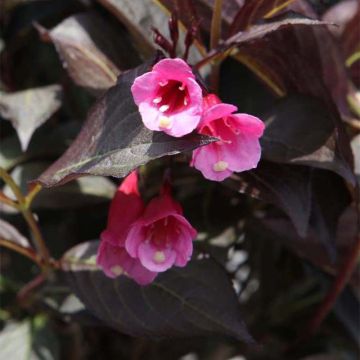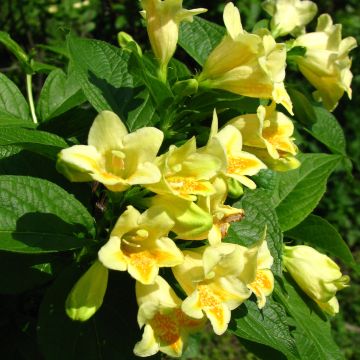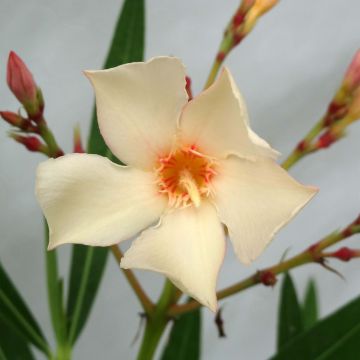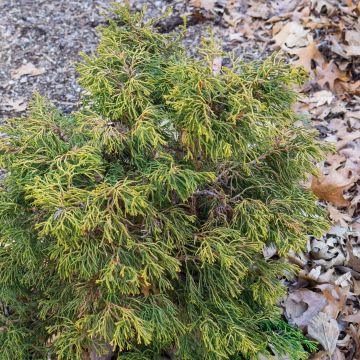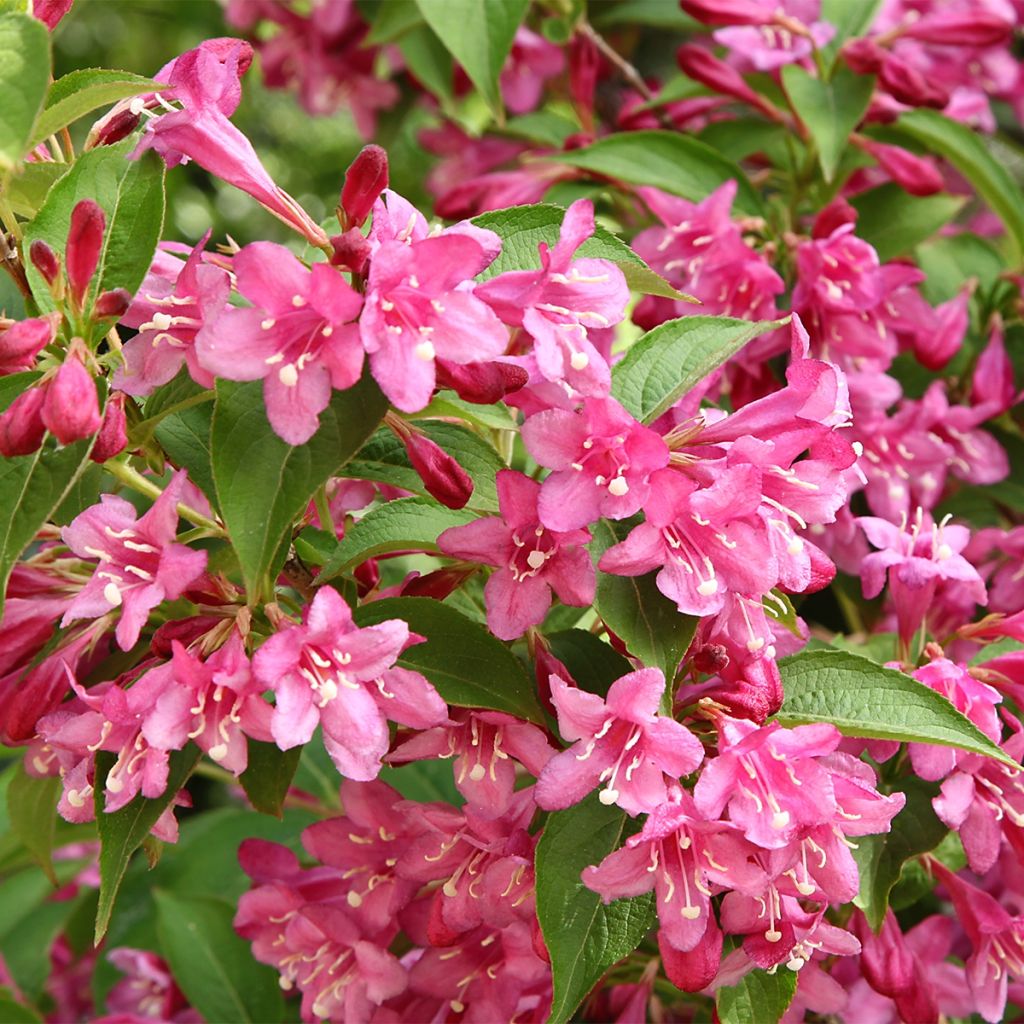

Weigela Minuet


Weigela Minuet
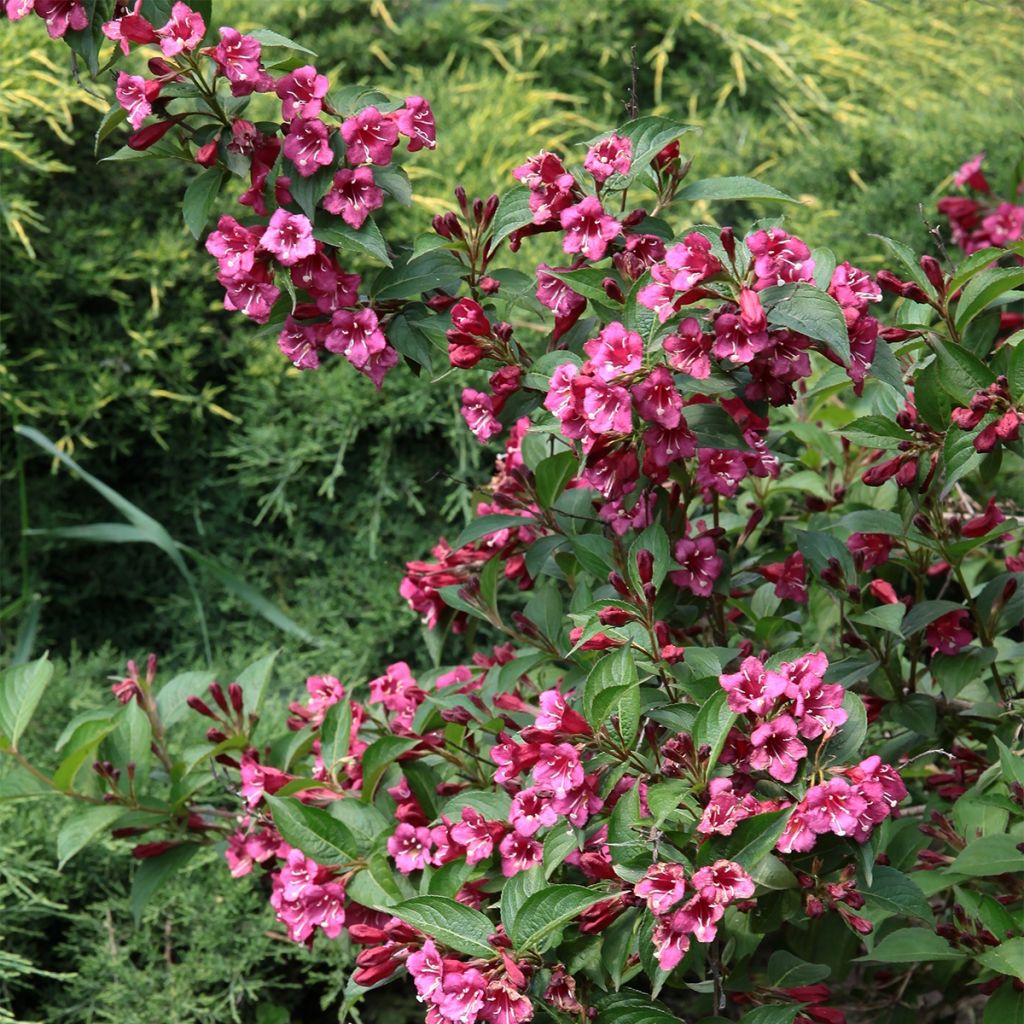

Weigela Minuet
Weigela Minuet
Weigela Minuet
Old-fashioned Weigela
Disappointed as the plant had been damaged during transport. I hope it will recover.
Isabelle, 11/10/2024
This item cannot be shipped to the selected country
Delivery charge from €5.90
Delivery charge from €5.90
More information
Schedule delivery date,
and select date in basket
This plant carries a 24 months recovery warranty
More information
We guarantee the quality of our plants for a full growing cycle, and will replace at our expense any plant that fails to recover under normal climatic and planting conditions.
From €5.90 for pickup delivery and €6.90 for home delivery
Express home delivery from €8.90.
From €5.90 for pickup delivery and €6.90 for home delivery
Express home delivery from €8.90.
Does this plant fit my garden?
Set up your Plantfit profile →
Description
Weigela 'Minuet' is a highly floriferous variety, flowering mainly in late spring, then blooming again in summer until September. It is covered with deep pink flowers that contrast nicely with its green foliage. With a very compact and bushy growth habit, this easy-to-grow shrub can be planted in a countryside or romantic setting, as well as in a small flowering hedge or border, and of course in a large pot on the terrace.
Originating from northern China, Japan, and Korea, Weigela florida is a deciduous shrub belonging to the Caprifoliaceae family, along with Abelia, Snowberry, and Honeysuckle, among others. This calcicolous (preferring calcareous soils) shrub has a fibrous and spreading root system, which tolerates transplantation perfectly. It has given rise, through hybridisation with other Weigela species, to numerous horticultural varieties, including the 'Minuet' cultivar.
'Minuet' is a very compact Weigela with a rather slow growth, eventually forming a ball shape of about 70 cm (28in) in all directions. The young shoots start off purple and then turn to a more or less dark green with some bronze nuances. This deciduous foliage is composed of sessile, pubescent leaves that are oval to elliptical in shape. Its funnel-shaped flowers are very attractive with their deep pink colour, and they open up to reveal white stamens that contrast with the corolla. They are borne in corymbs at the ends of the branches and bloom in successive waves from spring to September. The main flowering occurs in May-June, followed by additional blooms throughout the summer. The flowers are nectar-rich but do not produce fruits, and the plant does not exhaust itself as it tirelessly continues to flower. This miniature shrub adapts to most neutral to calcareous soils, including clay soils. It grows best in full sun or partial shade, in well-drained soil that is not too dry in summer. It is generally free from diseases or insect attacks and requires little maintenance.
Weigela 'Minuet' is one of those easy-to-grow shrubs that thrive in most regions, except for the hottest and driest ones. Its compact and rounded habit makes it an ideal shrub for terrace decoration when planted in a decorative pot. It can also be used for low borders and is perfect as a foreground plant in a flower bed. It can be accompanied by other accommodating plants, such as Forsythia x intermedia Mindor, which has a long yellow flowering season in early spring (March-April). The beautiful Deutzia hybride Raspberry Sundae will then take over with its romantic pinkish-purple and white flowers. And to end the season in style, a beautiful Lagerstroemia indica Black Solitaire Pure White, with its pure white flowers and almost black foliage, will create a stunning contrast as a background for our little Weigela.
Report an error about the product description
Weigela Minuet in pictures
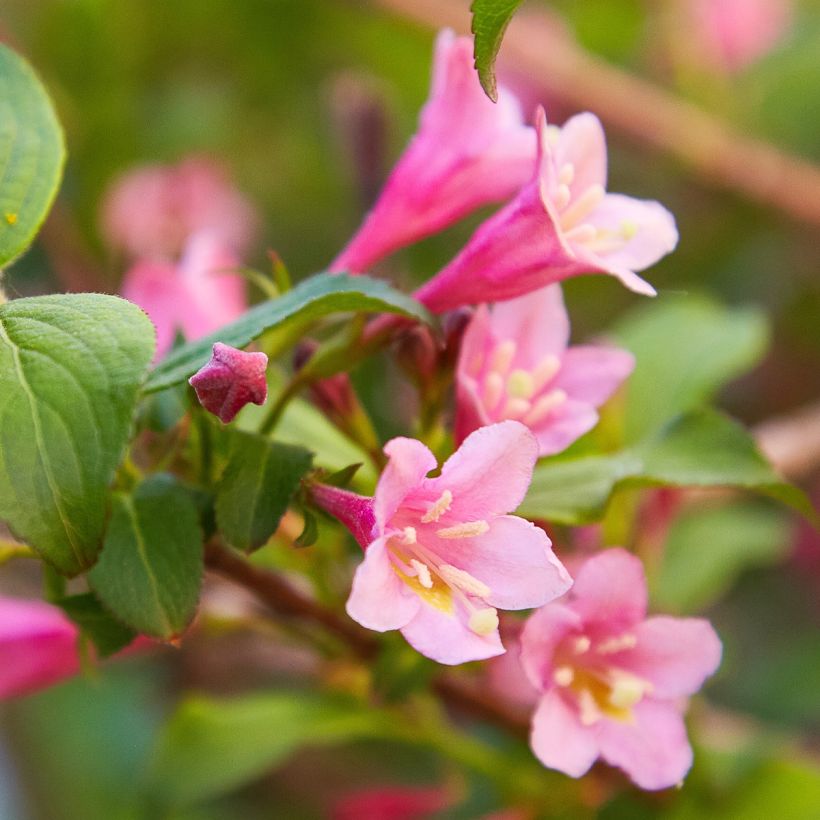

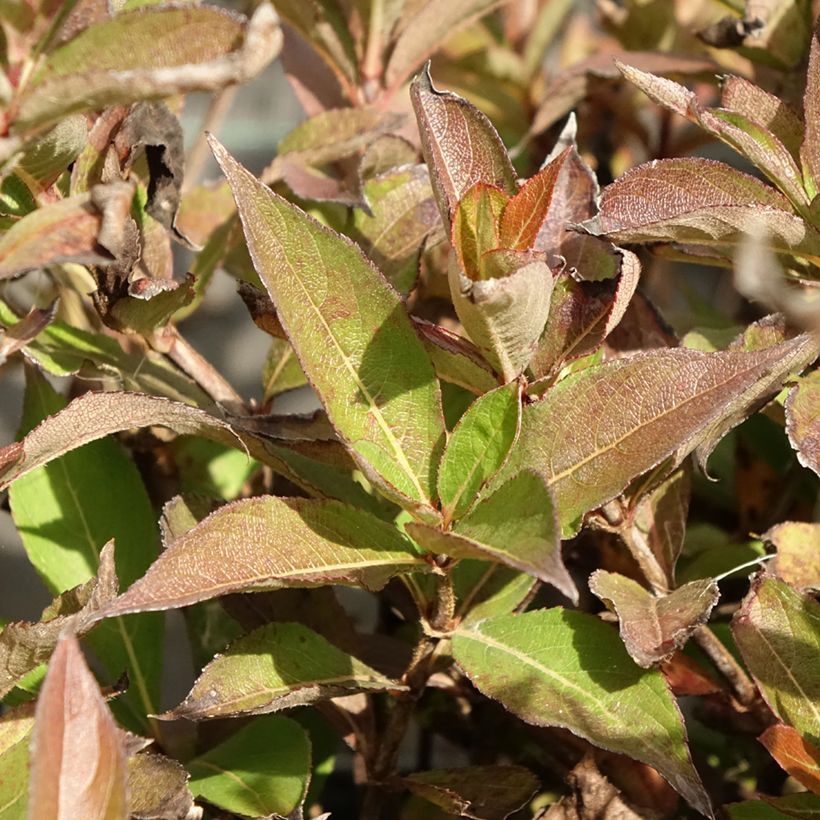

Plant habit
Flowering
Foliage
Botanical data
Weigela
Minuet
Caprifoliaceae
Old-fashioned Weigela
Cultivar or hybrid
Other Weigela
Planting and care
Hardy down to a minimum of -25 °C (-13 °F), Weigela 'Minuet' thrives in sunny or semi-shaded positions. Plant it in a deep, ordinary, moist, but loose and well-drained soil, with a neutral to slightly alkaline pH, from October to March (excluding the frost period). To maintain a compact habit and encourage flowering, shorten the branches that have produced spring flowers by 2/3, just after flowering.
Planting period
Intended location
Care
-
, onOrder confirmed
Reply from on Promesse de fleurs
Shrubs for pots
Haven't found what you were looking for?
Hardiness is the lowest winter temperature a plant can endure without suffering serious damage or even dying. However, hardiness is affected by location (a sheltered area, such as a patio), protection (winter cover) and soil type (hardiness is improved by well-drained soil).

Photo Sharing Terms & Conditions
In order to encourage gardeners to interact and share their experiences, Promesse de fleurs offers various media enabling content to be uploaded onto its Site - in particular via the ‘Photo sharing’ module.
The User agrees to refrain from:
- Posting any content that is illegal, prejudicial, insulting, racist, inciteful to hatred, revisionist, contrary to public decency, that infringes on privacy or on the privacy rights of third parties, in particular the publicity rights of persons and goods, intellectual property rights, or the right to privacy.
- Submitting content on behalf of a third party;
- Impersonate the identity of a third party and/or publish any personal information about a third party;
In general, the User undertakes to refrain from any unethical behaviour.
All Content (in particular text, comments, files, images, photos, videos, creative works, etc.), which may be subject to property or intellectual property rights, image or other private rights, shall remain the property of the User, subject to the limited rights granted by the terms of the licence granted by Promesse de fleurs as stated below. Users are at liberty to publish or not to publish such Content on the Site, notably via the ‘Photo Sharing’ facility, and accept that this Content shall be made public and freely accessible, notably on the Internet.
Users further acknowledge, undertake to have ,and guarantee that they hold all necessary rights and permissions to publish such material on the Site, in particular with regard to the legislation in force pertaining to any privacy, property, intellectual property, image, or contractual rights, or rights of any other nature. By publishing such Content on the Site, Users acknowledge accepting full liability as publishers of the Content within the meaning of the law, and grant Promesse de fleurs, free of charge, an inclusive, worldwide licence for the said Content for the entire duration of its publication, including all reproduction, representation, up/downloading, displaying, performing, transmission, and storage rights.
Users also grant permission for their name to be linked to the Content and accept that this link may not always be made available.
By engaging in posting material, Users consent to their Content becoming automatically accessible on the Internet, in particular on other sites and/or blogs and/or web pages of the Promesse de fleurs site, including in particular social pages and the Promesse de fleurs catalogue.
Users may secure the removal of entrusted content free of charge by issuing a simple request via our contact form.
The flowering period indicated on our website applies to countries and regions located in USDA zone 8 (France, the United Kingdom, Ireland, the Netherlands, etc.)
It will vary according to where you live:
- In zones 9 to 10 (Italy, Spain, Greece, etc.), flowering will occur about 2 to 4 weeks earlier.
- In zones 6 to 7 (Germany, Poland, Slovenia, and lower mountainous regions), flowering will be delayed by 2 to 3 weeks.
- In zone 5 (Central Europe, Scandinavia), blooming will be delayed by 3 to 5 weeks.
In temperate climates, pruning of spring-flowering shrubs (forsythia, spireas, etc.) should be done just after flowering.
Pruning of summer-flowering shrubs (Indian Lilac, Perovskia, etc.) can be done in winter or spring.
In cold regions as well as with frost-sensitive plants, avoid pruning too early when severe frosts may still occur.
The planting period indicated on our website applies to countries and regions located in USDA zone 8 (France, United Kingdom, Ireland, Netherlands).
It will vary according to where you live:
- In Mediterranean zones (Marseille, Madrid, Milan, etc.), autumn and winter are the best planting periods.
- In continental zones (Strasbourg, Munich, Vienna, etc.), delay planting by 2 to 3 weeks in spring and bring it forward by 2 to 4 weeks in autumn.
- In mountainous regions (the Alps, Pyrenees, Carpathians, etc.), it is best to plant in late spring (May-June) or late summer (August-September).
The harvesting period indicated on our website applies to countries and regions in USDA zone 8 (France, England, Ireland, the Netherlands).
In colder areas (Scandinavia, Poland, Austria...) fruit and vegetable harvests are likely to be delayed by 3-4 weeks.
In warmer areas (Italy, Spain, Greece, etc.), harvesting will probably take place earlier, depending on weather conditions.
The sowing periods indicated on our website apply to countries and regions within USDA Zone 8 (France, UK, Ireland, Netherlands).
In colder areas (Scandinavia, Poland, Austria...), delay any outdoor sowing by 3-4 weeks, or sow under glass.
In warmer climes (Italy, Spain, Greece, etc.), bring outdoor sowing forward by a few weeks.


































